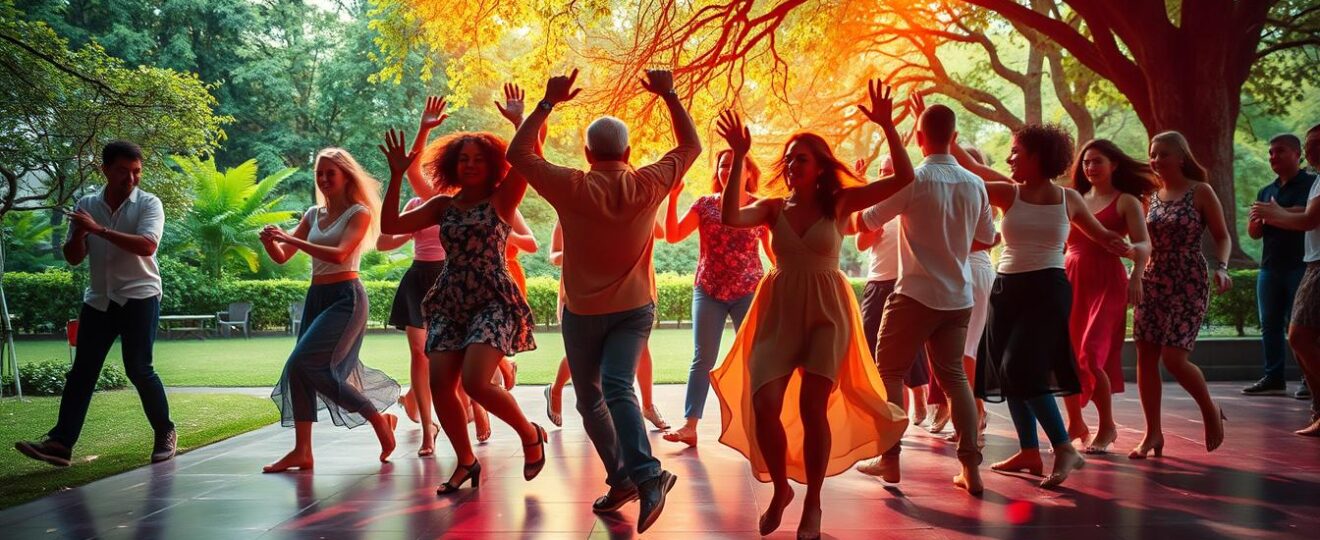Did you know that 280 million people worldwide fight depression? They’re looking for ways to feel better without medicine. Dancing is becoming a big help.
Dancing is more than just moving to music. It changes how we feel and is good for our minds. The World Health Organization says it’s as good as some medicines for our mental health.
Prefer to listen? Check out the podcast version below.
When you dance, you don’t just forget your worries. You also get many benefits for your mind. Every step you take is a step towards feeling better.
The Unparalleled Impact of Dancing on Mental Wellbeing
Key Takeaways
- Dancing is a strong way to help our mental health and fight anxiety and depression.
- The World Health Organization sees dance as a big health benefit.
- Dancing helps our mood and keeps our minds sharp.
- Dancing helps us feel better and connect with others.
- Dance helps us feel less alone and builds community.
- Health experts say dance is good for us, just like exercise.
- Dance is for everyone, no matter our abilities, and helps us learn new things.
The Unparalleled Impact of Dancing on Mental Wellbeing
Dancing does more than just keep us fit. It also boosts our mental health and makes us stronger emotionally. During and after COVID-19, dance therapy became very popular. It shows how dance can help us deal with daily stress and improve our lives.
Dance therapy is great for mental health. It helps with big emotional and mental problems. Dancing and moving to music can really help with dance for anxiety and depression.

Combatting Anxiety and Depression Through Dance
Studies show dancing helps with depression and anxiety. It lets us express our feelings and control our body’s health. This is true, as seen during the pandemic when gardening and dancing helped many people feel better.
People who dance feel happier and more connected. They have more endorphins and their brains work better together.
The Scientific Evidence Behind Dance’s Mental Health Benefits
Science backs up dance’s mental health benefits. Dr. Julia C. Basso found that even beginners feel happier after dancing. Programs like Dance to Health show dance keeps people healthy and connected, even online.
Dance is special because it lets us express our feelings through movement. This helps us feel better in a way that walking or jogging can’t.
Dance is a powerful tool for both body and mind. It’s a great addition to any health plan for better mental and physical health.
Dance Your Worries Away: The Mental Health Benefits of Dancing
Have you ever wondered why dancing makes you feel so free and happy? It’s not just the music—it’s a real mental boost. Dancing offers health benefits that help improve your mental well-being.

Dancing brings together physical activity, emotional expression, and community. It plays a big role in keeping your mind healthy. Every dance move brings emotional and physical benefits that help your mind.
Dancing keeps your memory sharp and your mind clear, which is great for older people. It also helps you make friends and feel less lonely. Feeling connected is key to good mental health.
| Mental Health Benefit | Details |
|---|---|
| Reduces stress | Dance lowers stress and anxiety, making you feel better. |
| Boosts confidence | Learning new dance moves boosts your self-esteem. |
| Enhances cognitive function | Dancing makes your brain work better, improving memory and decision-making. |
| Physical health impact | Dancing helps with depression and anxiety and improves physical health. |
Dance is also good for your wallet and your mind. Programs like ‘BallaTorino’ improve public health and save money. Every pound spent on arts returns £2.30.
Dancing is a way to forget your worries. So, when you’re feeling down, dance. It’s not just fun—it’s healing for your mind.
How Dancing Influences Your Emotional Health
Dancing has amazing emotional benefits. It helps improve how you feel about yourself and reduces stress. This is true for both old and new research.
Dancing is more than just fun. It’s a powerful way to feel better. It makes your brain happy by releasing special chemicals. It also helps you remember things better and stay focused.
Starting to dance can change your life. It can make you feel more confident and better about your body. This is key for improving self-esteem.
Studies show dancing can fight loneliness. It connects people and lets them share feelings in a special way.

| Benefit | Description | Impact |
|---|---|---|
| Reduction in Dementia Risk | Linked to frequent physical exercise including dance | Up to 76% lower risk |
| Mood Enhancement | Release of dopamine during dance activities | Improves overall emotional well-being |
| Stress Reduction | Endorphins released during physical activity | Helps alleviate stress and physical pain |
| Cognitive Benefits | Memory, focus, and attention from learning routines | Enhances cognitive functions |
Dancing is great for your body and mind. It leads to personal growth and happiness. Dancing alone or with others is a wonderful way to feel good and live a happy life.
Exploring Dance Therapy for Mental Health
Dance therapy is becoming more popular and scientifically proven. It helps improve emotional and psychological health through movement. It’s not just dance; it’s a way to better emotional health and well-being.

Dance therapy uses the healing power of dance. It mixes creative expression with physical activity. This lets you express feelings that are hard to say out loud.
The Healing Power of Dance as a Form of Expression
Dance therapy lets you express feelings in a special way. It touches the emotional and subconscious parts of your mind. People find joy and freedom in every movement.
Many studies and personal stories show its power. It helps improve mood and reduce stress and anxiety.
Establishing a Deep Connection Between Mind and Body
Dance therapy shows how mind and body are connected. It uses movement to help mental health. This therapy works both the body and mind.
It helps you feel grounded and centered. This builds strong mental resilience.
| Statistic | Effect on Mental Health |
|---|---|
| 98% mood improvement reported | Indicates high efficacy in uplifting emotional state |
| 81% with stress-related conditions | Shows significant reach in addressing complex emotional issues |
| Effect size of 0.54 in reducing depression | Substantial impact in alleviating depressive symptoms |
| Participants feeling more emotionally aware | Enhances self-perception and emotional intelligence |
Dance therapy for mental health is growing. Its benefits are getting better and wider. It’s a great option for improving mental health in a fun and holistic way.
Engaging in Dance for Stress Relief and Joy
Feeling stressed or wanting more joy? Dance your worries away and enjoy the benefits of dancing for stress relief. This fun activity boosts your mood and strengthens your body and mind.
Dancing changes your mood by releasing happy chemicals in your brain. It’s not just about moving. It’s about making your mind happy too. Dancing regularly brings a steady rhythm to your life, helping you escape daily stress.

Turning Pointe Dance Studio offers a welcoming place for all. Here, different dance styles help improve your health. From tiny dancers to adults, there’s a class for everyone.
Let’s look at the studio’s class schedule:
| Class Type | Age Group | Sessions |
|---|---|---|
| Beginner Acro | 5 & up | Year-round |
| PreSchool Combo | 3-4 | Year-round |
| Ballet | 5 & up | Year-round |
| Beginner Hip Hop | 5 & up | Year-round |
Classes are just $15 each. The supportive atmosphere helps reduce stress and uplifts your soul.
Dancing also lowers your heart rate and calms your nerves. It’s a healing activity that boosts your well-being and heart health.
In short, Turning Pointe Dance Studio is more than dance lessons. It’s a community that helps you dance your worries away and find joy. With classes for all ages and skill levels, dancing is a universal stress-reliever and joy-booster.
The Scientifically-Proven Benefits of Dancing on the Brain
Dance and mental health research show us how dance helps our brains. It makes us feel better and keeps our brains sharp as we age. Dancing is more than just moving; it’s a way to keep our minds strong.
Studies say dancing can make our brains work better. A study from Albert Einstein College of Medicine found dancing can lower dementia risk by 76%. Dancing can make our brains better, one step at a time.
Dancing changes our brains in good ways. It helps our nerve cells stay healthy. It also makes our brain’s hemispheres talk better, helping us remember and think clearly.
Dance does more than just keep us fit. It makes our brains more flexible and adaptable. This is very important for people with brain problems.
Dance therapy helps people with big challenges like stroke and Parkinson’s. It’s a way to express feelings and improve our mental health. It’s also good for keeping our brains sharp as we get older.
But, sadly, most teens don’t dance enough. The World Health Organization says 80% of teens don’t get enough exercise. They miss out on the brain benefits dance can offer.
Think about adding dance to your life. It’s not just fun; it’s good for your brain. Dancing can help you stay sharp, no matter how old you are.
Let’s dance our way to a smarter, healthier brain. Our minds and bodies will thank us!
Dance and Social Wellbeing: Building Connections and Community
Dancing is fun and good for your body and mind. It helps you make new friends. When you dance, you’re part of a group that shares fun moments.
Dance classes, like salsa or modern, make you feel part of a group. Whether it’s a class or dancing in a park, every move brings you closer to others. It’s a special way to connect with people.
- Learning a new dance together can make strong bonds fast.
- Dancing helps fight loneliness and improves talking to others.
- These dance friendships can last a long time, making life better.
Dancing often means you’re active and meet new people. This mix of exercise and socializing fights loneliness. It builds a strong social network.
Many people say dance helped them find friends. Their stories show dance’s power to improve mental health and social life.
Dance events make places of joy and connection. Dancing can open doors to a richer, more connected life. It shows how dance and social wellbeing are closely linked.
Practical Tips: Integrating Dance into Your Daily Routine
Dance brings joy and dance’s mental health benefits. You can dance at home or in a studio. It makes you feel better and improves your mood.
Many people dance for fun and exercise. It gets your heart rate up, helping with depression and anxiety. Dancing also helps you feel less lonely and connects you with others.
Find a dance style that feels right for you. Try salsa or ballet. Each dance has its own benefits, like improving your mind and body.
But, watch out for injuries like hip or knee problems. Warm up well to stay safe and enjoy dancing.
- Ballroom dancing not only teaches you new skills but allows you to engage in a social dance community.
- Modern dance offers a therapeutic platform for expressing emotional and creative instincts.
Dance helps your emotional well-being by building social bonds and reducing stress. Don’t worry if you feel shy. Everyone starts somewhere. Just dance at your own pace.
Adding dance to your day improves your health and happiness. So, put on your dancing shoes and let the music lead you to a better life.
Conclusion
Dance is more than just moving to music. It’s a strong way to help our mental health. Studies show that dance can make us feel better for a long time.
Teenage girls who danced felt happier for up to eight months. This shows that dance can bring lasting happiness. It’s not just a quick fix.
Seniors who danced felt better and smarter too. This shows dance can help people of all ages. It makes us feel stronger and more confident.
Dance classes help us make friends and feel good together. Places like Central Pennsylvania Youth Ballet and Zumba classes show dance’s health benefits. Dance helps us stay sharp and happy.
Dance is not just about moving. It’s about feeling, connecting, and growing. It helps us in many ways, making us whole.
FAQ
How does dancing help combat anxiety and depression?
Dance makes us feel good by releasing happy chemicals in our body. It lets us express ourselves and manage stress. Plus, it helps us meet new people, which can make us feel better.
What scientific evidence supports the mental health benefits of dance?
Studies show dance is better than walking or jogging for feeling less sad. It helps us know ourselves better and feel good. Dance is special because it helps our body and mind in many ways.
Can dancing improve self-esteem?
Yes, dancing can make us feel more confident. It lets us show who we are and achieve things. It also helps us meet people, which boosts our self-image.
How does dance therapy aid in mental health?
Dance therapy uses movement to help us express our feelings. It connects our body and mind, relaxes us, and helps us find ourselves again. It’s very good for our mental health.
What neuroprotective effects does dance have?
Dance can make our brain work better and might even prevent memory loss. It’s good for our brain health. This is because it keeps our brain active and healthy.
How does dance promote social well-being?
Dance is a fun way to meet people. It helps us make new friends and keeps us connected with others. It makes us feel less lonely by sharing a fun experience.
What are some practical ways to integrate dance into my daily life?
You can take a dance class, go to a dance event, or dance at home. Pick something you like and feel comfortable with. This way, you can enjoy dancing and express yourself freely.
Is dance beneficial for people of all ages?
Yes! Dance is good for everyone, no matter how old you are. It helps teens and seniors feel better mentally and physically. It’s a great way to stay healthy and happy.
Can dance be considered a sustainable mental health practice?
Yes, dance is a great way to take care of your mind and it’s affordable. It’s fun, easy to do, and helps your mental health for a long time. It’s a smart choice for your mind and wallet.
How does dancing affect cognitive functions?
Dancing can make our memory and thinking skills better. It works our brain in many ways. This helps keep our brain sharp and might even slow down memory loss as we get older.
Can dance replace traditional forms of exercise for mental health?
Dance can be a fun addition to your exercise routine, but it shouldn’t replace it. Mixing up your activities is good. Dance is great if you enjoy it more and it makes you feel good.







